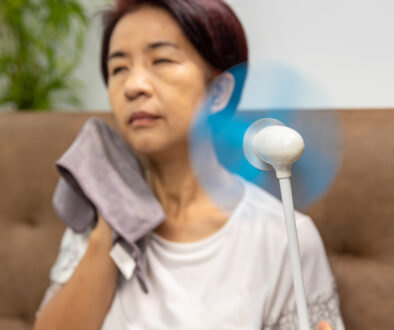3 Things You Need to Know About Perimenopause
You’ve heard all about the hot flashes and night sweats that accompany menopause.
But how much do you know about perimenopause, the years of “transition” that lead to menopause?
Here’s what you need to know about perimenopause, including a look at some of the latest menopause treatments to help alleviate the irritating symptoms.
What is perimenopause?
And is there a difference between menopause and perimenopause?
A woman is in menopause when she has not had a period for one year. While the average age of onset is 51, menopause normally occurs between 45 to 55 years of age. During this time, she may wish to seek menopause treatments.
Perimenopuase is the time leading up to menopause.
It varies from woman to woman, but you may start to see signs of perimenopause in your mid-40s when estrogen levels start to fluctuate.
The perimenopause phase can last up to 10 years. During these years, your varying estrogen levels mean you’ll have changes in your menstrual cycle and ovulation. That’s what we’re going to focus on.
What Are the Symptoms of Perimenopause?
Because your ovarian hormones, estrogen and progesterone, are fluctuating, you may have irregular periods.
Some may be shorter while others will be longer and heavier. Irregular bleeding and spotting are also common, and you may skip periods.
While irregular periods are common during perimenopause, there are some instances in which you’ll need to schedule an appointment with one of our providers.
The following problems could indicate complications or problems:
- You’re bleeding to the point that you have to change your pad or tampon every two hours or less.
- You have any bleeding between your periods.
- Bleeding lasts more than seven days.
- Your periods are fewer than 21 days apart.
You’ll find that you’re having some of the symptoms of perimenopause are similar to menopause, such as:
- Hot flashes
- Sleep problems (which may or may not be due to night sweats)
- Painful intercourse due to thinning vaginal tissue and insufficient lubrication
- Bladder control problems
- Mood swings
Women experience these symptoms in varying degrees. You may have only a couple of these symptoms. You may have none at all.
3 Things You May Not Know About Perimenopause
Can you get pregnant during perimenopause?
Yes, you can still get pregnant when you’re in perimenopause.
Remember, in order to officially be in menopause you have to have no periods for one year.
As long as you’re having periods—even irregular ones—there is a possibility that you could become pregnant.
Do not stop birth control until it is clear that you are in menopause.
You may experience a change in cholesterol levels.
Declining estrogen can cause an increase in “bad” cholesterol—called your LDL cholesterol.
This can increase your risk of heart disease.
You are at greater risk for osteoporosis.
As estrogen levels decline, you will begin to lose bone faster than it can be replaced.
It’s important to have a regular bone density exam to accurately assess your risk for developing osteoporosis. New bone growth is much slower in perimenopause, but bone loss is actually related to menopause.
Important Information About Menopause Treatments
Once you are in menopause, the primary menopausal treatments involve taking estrogen and/or progesterone to increase the amount of these hormones in your system.
It may be delivered systematically—that is, in a pill form that travels throughout your whole system— or locally, which means it is delivered through vaginal creams, rings or other topical treatments.
However, it’s important to note that hormones are not the only type of treatments available.
Please schedule an appointment and speak to us so we can provide additional information.
What is Biodentical Hormone Therapy?
You may have heard this term before. Some companies use these words to imply that the products they create are identical to your natural hormones, and therefore, indicate that they are safer than typical menopause treatments.
However, it’s important to realize that the FDA doesn’t recognize or regulate them.
In short, there haven’t been any studies to evaluate the safety or effectiveness of these products. (Office of Women’s Health) If you have any questions, please speak to us.
At Every Stage of Your Life, We’re Here for You
At Chapel Hill OBGYN, we have been caring for generations of women throughout every stage of their lives.
We consider it a privilege to treat you, whether you’re expecting your first child or you’re entering menopause.
We would love to be your medical home. Please contact us to schedule an appointment.
For more than 40 years, Chapel Hill OBGYN has served women in the Triangle area, sharing the joy of little miracles and supporting them during challenges. Our board-certified physicians and certified nurse midwives bring together the personal experience and convenience of a private practice with the state-of-the-art resources found at larger organizations. To schedule an appointment, please contact us for more information.




